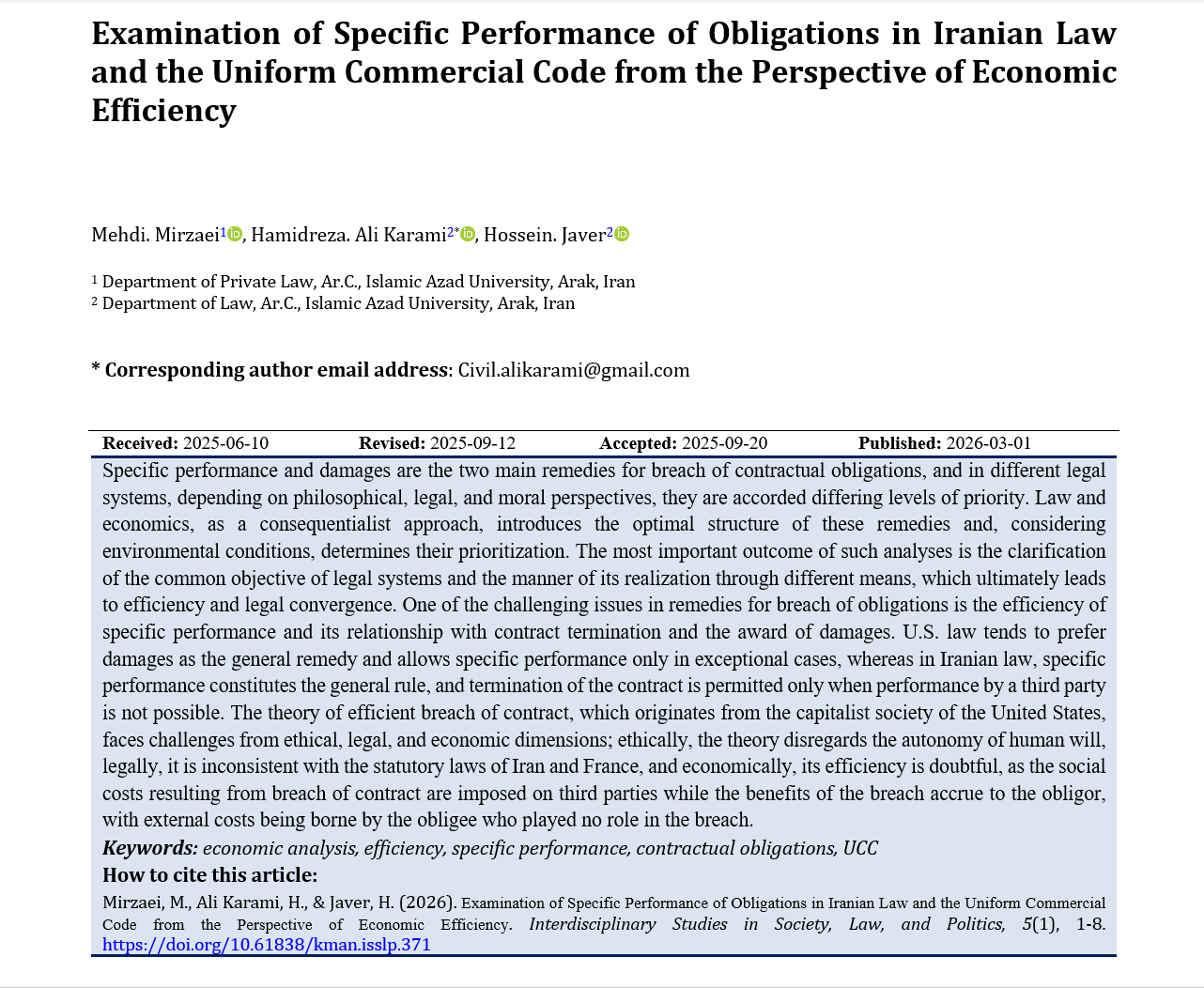Examination of Specific Performance of Obligations in Iranian Law and the Uniform Commercial Code from the Perspective of Economic Efficiency
Keywords:
economic analysis, efficiency, specific performance, contractual obligations, UCCAbstract
Specific performance and damages are the two main remedies for breach of contractual obligations, and in different legal systems, depending on philosophical, legal, and moral perspectives, they are accorded differing levels of priority. Law and economics, as a consequentialist approach, introduces the optimal structure of these remedies and, considering environmental conditions, determines their prioritization. The most important outcome of such analyses is the clarification of the common objective of legal systems and the manner of its realization through different means, which ultimately leads to efficiency and legal convergence. One of the challenging issues in remedies for breach of obligations is the efficiency of specific performance and its relationship with contract termination and the award of damages. U.S. law tends to prefer damages as the general remedy and allows specific performance only in exceptional cases, whereas in Iranian law, specific performance constitutes the general rule, and termination of the contract is permitted only when performance by a third party is not possible. The theory of efficient breach of contract, which originates from the capitalist society of the United States, faces challenges from ethical, legal, and economic dimensions; ethically, the theory disregards the autonomy of human will, legally, it is inconsistent with the statutory laws of Iran and France, and economically, its efficiency is doubtful, as the social costs resulting from breach of contract are imposed on third parties while the benefits of the breach accrue to the obligor, with external costs being borne by the obligee who played no role in the breach.
Downloads
References
Abdi Pour, E. (2012). Analytical Topics in Commercial Law. Hawzah and University Research Institute.
Aghapour, H. (2018). The Method of Compelling the Performance of Contractual Obligations (Iranian Law - Imami Jurisprudence). Quarterly Journal of Comparative Law Research: Justice and Equity, 1(1).
Ahmadi, M. R. (2009). A Reflection on the Concept, Foundations, and Types of Obligation. 11(26).
Amini, M., & Shukouhian, A. (2019). Economic Analysis of Sanctions for Breach of Obligation (Mandatory Performance of the Obligation). Quarterly Journal of Private Law Studies, 49(1).
Ansari, A., Baydani, H., & Shahi, A. (2017). Investigating the Efficacy of Prioritizing Specific Performance over Contract Termination in US and Iranian Law. Bi-quarterly Journal of Economic Law Encyclopedia, 24(11).
Badini, H. (2012). Strict Liability: Foundations and Instances. Journal of Comparative Law Studies, 3(1).
Bahrami Ahmadi, H. (2011). Law of Obligations and Contracts. Imam Sadiq University Press.
Bahrami Ahmadi, H. (2015). Civil Liability. Mizan Legal Foundation.
Baker, S. N. (2008). Foreign law between domestic commercial parties: A party autonomy approach with particular emphasis on North Carolina law. Campbell Law Review, 30, 437-470.
Dadgar, Y., & Ehsani, A. (2020). An Economic Analysis of Breach of Obligation in E-commerce with a Consumer Rights Approach. 3(6).
Eisenberg, T., & Miller, G. P. (2013). Damages versus specific performance: Lessons from commercial contracts.
Hillman, A. R. (2014). The future of fault in contract law. Duquesne Law Review, 52.
Kaffash, M., & Sadeghi, M. (2019). An Analytical Study of Guarantees for Economic Freedom in the Iranian Public Law System (with Emphasis on the Five-Year Socio-Cultural and Economic Development Plan). Quarterly Journal of Business Research(93).
Katouzian, N. (1991). Civil Law: Iqa'. Yalda Publications.
Katouzian, N. (2010). General Theory of Obligations. Mizan.
Lehmann, M. (2008). Liberating the individual from battles between states: Justifying party autonomy in conflict of laws. Vanderbilt Journal of Transnational Law, 14, 381-434.
Mafi, H., & Taghipour, M. H. (2015). The Applicable Law to Contractual Obligations in European Union and US Law. Private Law Research.
Marshall, B. A. (2012). Reconsidering the proper law of the contract. Melbourne Journal of International Law, 13, 1-35.
Parsapour, M. B., & Hosseini, A. (2020). A Comparative Study of the Basis of Civil Liability in Common Law and Iranian Law with regard to Trustee Liability. Quarterly Journal of Comparative Research on Islamic and Western Law(1).
Posner, R. A. (2003). The economic analysis of law. Aspen Publishers.
Safaei, H. (1972). Preliminary Course on Civil Law: Obligations and Contracts (Vol. 2).
Safaei, H. (2012). General Rules of Contracts (Vol. 2). Mizan Publications.
Shahidi, M. (2005). Formation of Contracts and Obligations. Majd Publications.
Shavell, S. (2003). Economic analysis of litigation and legal process.
Shavell, S. (2006). Economic analysis of litigation and legal process.
Talebian, H., & Isaei, T. (2023). Foundations and Nature of Contract Termination for the Convenience of the Employer in International Investment Contracts (A Comparative Study of US and Iranian Law). Legal Research, 22(1).
Tousi, A. (2014). Economic Analysis of Corporate Law. Danesh Shahr Legal Studies and Research Institute.

Downloads
Additional Files
Published
Submitted
Revised
Accepted
Issue
Section
License
Copyright (c) 2025 Mehdi Mirzaei, Hamidreza Ali Karami, Hossein Javer (Author)

This work is licensed under a Creative Commons Attribution-NonCommercial 4.0 International License.





